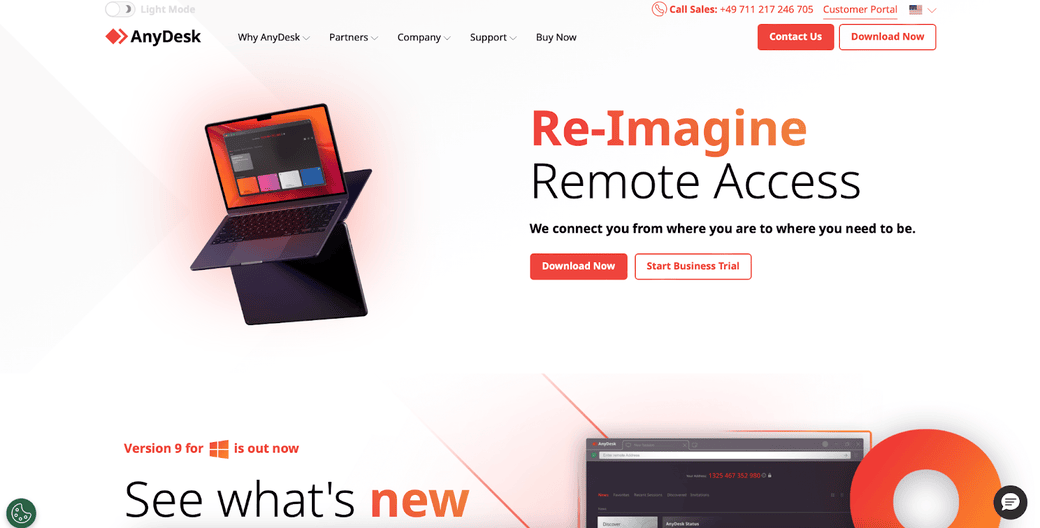Is BetterHelp a Scam?
Laura Martisiute
Reading time: 8 minutes

Table of Contents
If you’re thinking of using BetterHelp, you need to know: Is BetterHelp a scam?
Below, we explain whether BetterHelp is a scam and discuss some steps you can take to improve your safety when using this online platform.
What Is BetterHelp?
BetterHelp is the world’s largest online mental health platform.

The platform, which is available worldwide, connects users with accredited psychologists, social workers, marriage and family therapists, and licensed professional counselors.
Users can interact with their assigned counselors through private messages, live chats, and scheduled video or phone sessions.
Prices vary based on location and demand (surge pricing). The platform does not accept health insurance, which can make it more expensive compared to traditional therapy with insurance coverage.
BetterHelp was founded in 2013 by Alon Matas and Danny Bragonier and was acquired by the telehealth company Teladoc Health in 2015 (but continues to operate under its original name).
Is BetterHelp a Scam?
No, BetterHelp is not a scam. It’s a legitimate online therapy platform.
The BetterHelp platform gets positive reviews from sites like VeryWell Mind and Healthline.
Reviews on online forums are mixed.
Some people report positive experiences.

Others report negative experiences. In particular, many users say they had impersonal or unengaged responses from their therapists.

There have also been reports of “sketchy” therapists.
According to BetterHelp, therapists who want to be on the platform must provide documentation and undergo a “thorough” verification process, including background checks.

Many therapists report that they wouldn’t use the platform because of how poorly it pays as well as due to poor boundary setting (“They advertise that you’ll be able to message your therapist at any time which doesn’t set up a foundation for proper boundaries,” according to one).
BetterHelp gets a 4.6 out of a 5.0-star rating (from 55.6k ratings and 1m+ downloads) on Google Play. It gets a 4.8 out of a 5.0-star rating (from 139.2k ratings) on the App Store.
Security
BetterHelp explains how it keeps your data secure in its privacy policy.
It says its platform is certified by HITRUST and that they have an Information Security team that tests internal security at BetterHelp.
In addition, messages between BetterHelp members and their therapists have 256-bit encryption, servers are distributed across multiple Tier 3 AWS Data Centers, its browsing encryption system follows modern practices, databases are encrypted and scrambled, and there are robust monitoring and alerting systems and procedures in place, including automated systems and humans (with security personnel active 24/7).
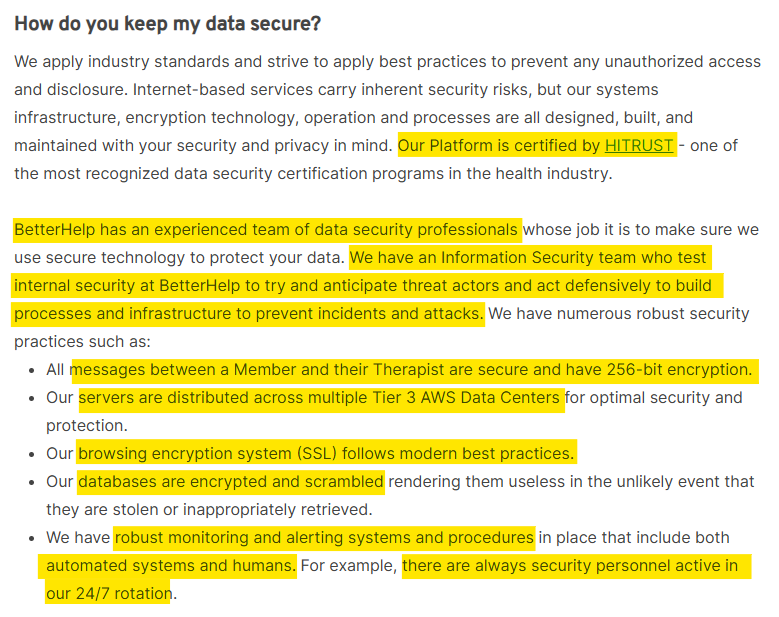
According to the Mozilla Foundation, it’s unclear whether BetterHelp has effective systems to address security vulnerabilities within their app.
When the team at Mozilla Foundation reached out to BetterHelp listed privacy contact with questions about their privacy measures, they received no response.
On its Google Play page, BetterHelp says it encrypts data in transit. You can also request that your data be deleted.

Privacy
BetterHelp has faced backlash for allegedly sharing customers’ personal data with third parties.
In 2023, the Federal Trade Commission (FTC) issued a proposed order banning BetterHelp from sharing consumers’ health data for advertising purposes.

Apparently, BetterHelp collected sensitive personal information, including mental health details, email addresses, and IP addresses, during the signup process and shared this data with third parties for targeted advertising.
The platform used consumers’ data to instruct platforms like Facebook to identify and target similar individuals with advertisements for its services.
The FTC said BetterHelp did not obtain affirmative express consent from users before disclosing their health data and failed to implement adequate safeguards to protect this information.
In 2020, BetterHelp denied reports that it shared consumers’ personal and health information with third parties.
In its privacy policy, BetterHelp outlines the kind of data it collects, why, and whom it shares it with.
It collects visitor data (e.g., pages you visit, features you interact with, IP address, etc.), onboarding data, account data (e.g., account name, contact information, demographic information, etc.), user ID, transaction data, engagement data (e.g., how you interact with BetterHelp emails), therapy data (e.g., messages with therapists, journal entries, etc.), therapy quality data (e.g., reviews), customer service and communications data, therapist data (therapist information like therapist’s name – this is if you want to be a therapist on BetterHelp), BetterHelp business data (for employers and groups), therapist engagement data (for therapists), and clinical health record (minimum information your therapist would need to identify you).
BetterHelp may share this data for legal compliance, to facilitate its operations with service providers, for business operations, etc.
Under the section “Do you sell my data?” it says, “We aren’t paid by anyone for any data.”

BetterHelp has a pretty detailed data retention section where it outlines how long it shares your data based on who you are and how you’ve engaged with its platform and services.
For example, if you’re a member who did not start therapy, then BetterHelp says it will retain your data for three years after your last login date, after which it will erase it. On the other hand, if you did start therapy, your data is retained for 10 years. This is if you do not request data erasure.
If you request data erasure and did not start therapy, your data is erased within 24 hours of the request. However, if you did start therapy, certain data (like clinical health records) is only erased after 10 years, though most other personally identifiable information (e.g., onboarding data, therapy data, etc.) is erased within 24 hours.
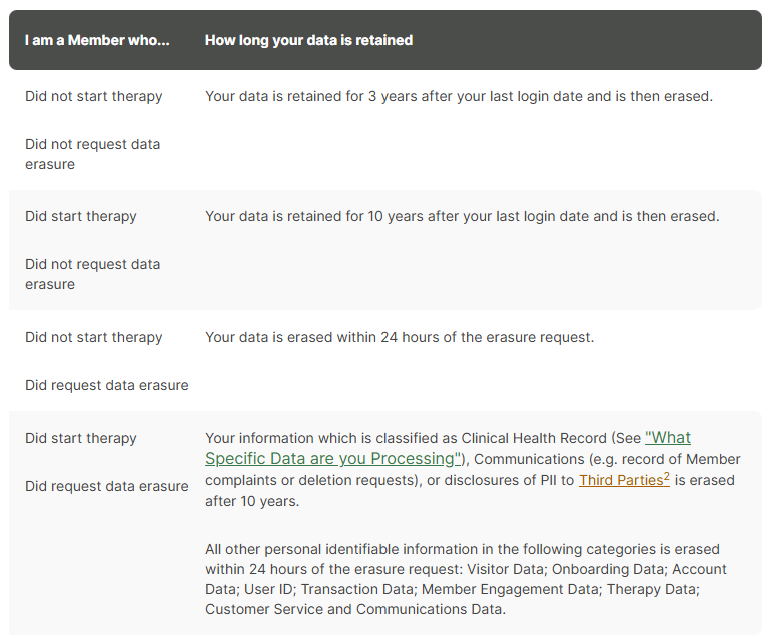
In its privacy policy, BetterHelp also answers questions like “Can I sign up for the service and remain anonymous?” (not really) and “Who can see the interactions I have with my therapist?” (you and your therapist, a BetterHelp therapist employed as part of the BetterHelp Clinical Operations Team, and BetterHelp internal Trust and Safety or Legal teams if there’s reason to believe there is a security, legal, or fraud issue happening on a particular account).
On its Google Play page, BetterHelp says it collects your device or other IDs, messages, personal information (e.g., name, address, email address, phone number, sexual orientation, and religious beliefs), photos and videos, files and docs, financial information, location, health and fitness, audio, and app activity.
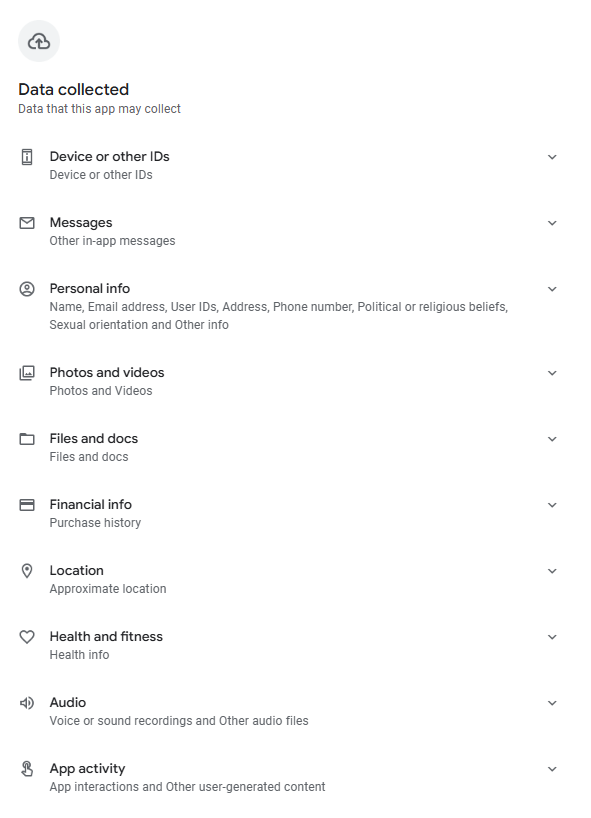
It also says it does not share data with third parties.

Terms of Service; Didn’t Read (ToS;DR), a project that rates internet services’ terms of service and privacy policies, gives BetterHelp a “Grade D.” This means, “The terms of service are very uneven, or there are some important issues that need your attention.”
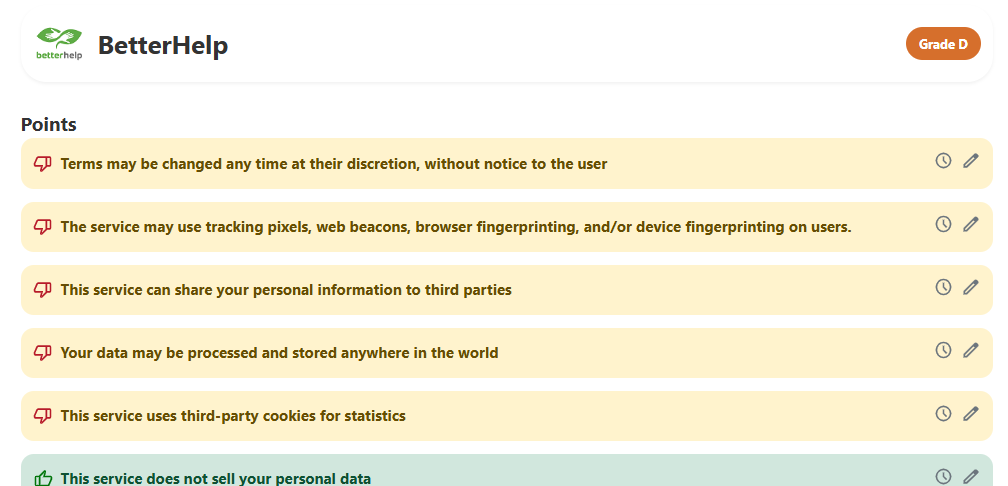
Among the concerns listed are the following:
- BetterHelp can change the terms at any time without notifying the user.
- It can use tracking pixels, web beacons, browser fingerprinting, and/or device fingerprinting.
- It can share your personal information with third parties.
- It can store and process your data anywhere in the world.
- It uses third-party cookies for statistics.
On a positive note, ToS;DR says that BetterHelp does not sell your personal data.
The Mozilla Foundation gives BetterHelp a “Privacy Not Included” label.
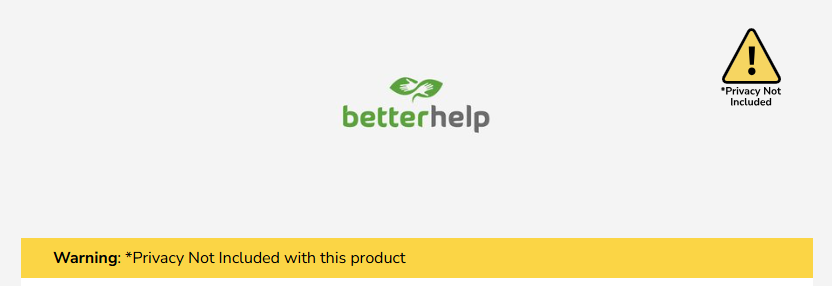
The Common Sense Privacy Program also gives BetterHelp a “Warning” rating, which means the platform “Does not meet our recommendations for privacy and security practices.”
So, Should You Use BetterHelp?
Depends.
Although BetterHelp offers a large network of therapists and good accessibility to them, there are significant concerns regarding privacy, data sharing, and service reliability.
As such, you may want to consider other reputable online therapy platforms that may have stronger privacy protections and more consistent service quality.
How to Use BetterHelp Safely
Here are some tips for a safer experience with BetterHelp.
- Consider alternative options. If privacy and data security are significant concerns for you, look at other reputable online therapy platforms. Evaluate alternative services based on their privacy policies, data-sharing practices, user reviews, and regulatory compliance.
- Limit personal information sharing. Don’t disclose sensitive personal details unless absolutely necessary for your treatment. Share only the necessary information required for therapy.
- Read the privacy policy. Before signing up, read BetterHelp’s privacy policy to understand how your data is collected, used, and shared.
- Create a strong password. Use a strong, unique password for your BetterHelp account.
- Keep the BetterHelp app updated. Make sure that both the BetterHelp app and your device’s operating system are always updated to the latest versions to benefit from security patches and new features.
- Verify emails. Be on the alert for unsolicited emails claiming to be from BetterHelp. Always verify the sender’s email address and avoid clicking on suspicious links.
- Limit app permissions. Limit BetterHelp’s access to your device’s camera, microphone, location, and other sensitive features unless necessary for your therapy sessions.
- Request a copy of your data. BetterHelp allows you to request a copy of your data. To do so, log in to your BetterHelp account and go to Menu > My Account (or Account settings) > My Personal information. You will see an option to request a copy of your data.
- Erase your data. If you decide to discontinue using BetterHelp, request data erasure.
Our privacy advisors:
- Continuously find and remove your sensitive data online
- Stop companies from selling your data – all year long
- Have removed 35M+ records
of personal data from the web
Save 10% on any individual and
family privacy plan
with code: BLOG10
news?
Don’t have the time?
DeleteMe is our premium privacy service that removes you from more than 750 data brokers like Whitepages, Spokeo, BeenVerified, plus many more.
Save 10% on DeleteMe when you use the code BLOG10.



